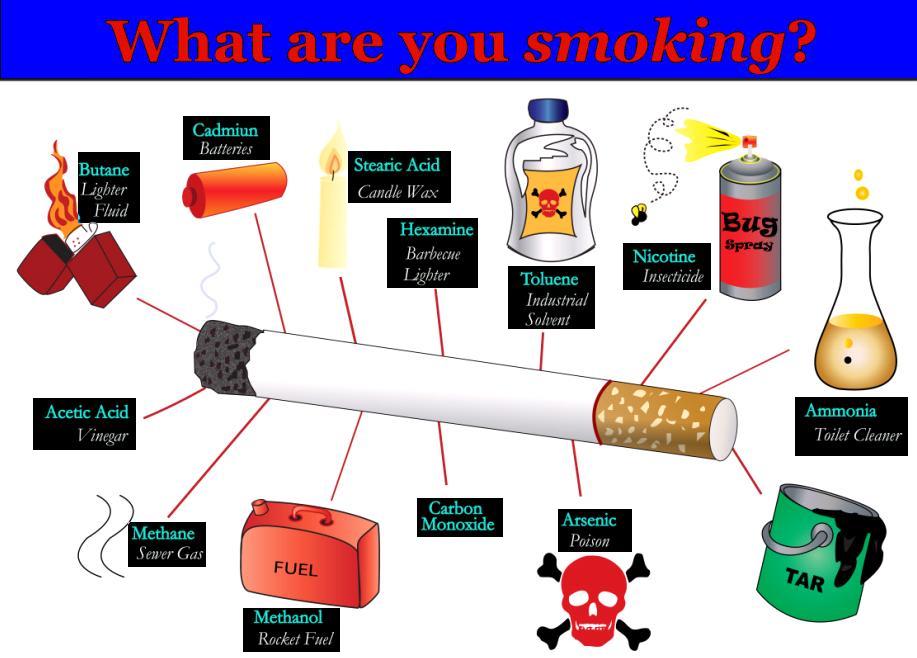
One of the most common medical questions revolves around smoking. Smokers want to know the dangers of smoking and how quitting can help. Once a person stops smoking, how quickly can they reduce their risks and regain their health? The truth is that smoking negatively affects every aspect of your health, from minor inconveniences to major health issues and possible death. The dangers of smoking are very real, but preventable.
Cigarettes contain a variety of harmful ingredients that are not meant for human consumption. Formaldehyde, arson, tar and a long list of other damaging chemicals combine to create a potentially lethal combination. The effects don’t take place overnight, but over time. The risk for serious health problems increases with repeated use.
Breathing Problems
Smokers often have a persistent cough. They get easily winded when exercising or climbing a flight of stairs. They have an increased risk for asthma attacks and emphysema, which involves damaged air sacks that trap stale air in, making it difficult to breathe fresh air. An air tank is often necessary for those who suffer from emphysema.
Those who smoke are also at high risk for developing lung cancer. The carcinogens in cigarettes are what causes the damage. They alter the DNA, leaving the lungs more susceptible to cancer. While there is some debate over whether smoking is actually to blame for lung cancer since most smokers’ live long lives, the American Lung Association states that 80 of lung cancer deaths in men and 90 percent of lung cancer deaths in women are caused by smoking.
Smoking Restricts Blood Flow
Most major health problems that are associate with smoking stem from the fact that it restricts blood flow. That means that blockages and blood clots are more likely to occur. When blood flow is reduced, it affects all of the organs in the body. Blood needs to be pumped throughout the body without restrictions for optimal health. Such blockages can lead to a stroke or heart attack. In some instances, it can even lead to death.
When smoking is the only risk factor for coronary heart disease, the risk is high, but it is even higher if the smoker has other health concerns. Obesity, high cholesterol, age, race, and family history all play a role in heart disease. Any of these factors, when paired with smoking, increases the risk for sudden heart attacks.
Smoking Damages Every Part of the Body
Smoking leads to more than lung cancer and heart disease though. The poisonous toxins from cigarettes are responsible for all types of cancer, gum disease, tooth loss, cloudy vision, infertility, high cholesterol and a lowered immune system. Smoking causes irritability, depression and anxiety. These toxins also destroy a smoker’s appearance by causing premature wrinkles, yellowed skin, hair loss and discolored teeth. Smelly hair and bad breath are also telltale signs of a smoker. If these issues aren’t reason enough for concern, consider the more serious long-term effects of nicotine use.
To answer one of the most common medical questions, smoking does pose real and life-threatening diseases. There is more to smoking than the high cost and the smell of smoke on clothing. Furthermore, the second-hand smoke can cause detrimental effects on those close enough to inhale it on a regular basis. But the effects can be reversed.
Quitting Is Possible
Every day a smoker goes without inhaling cigarette smoke is one day closer to reducing the risks associated with smoking and reclaiming their health. Minor problems are resolved in a matter of days, once all of the nicotine is out of the system. Nerve endings are repaired, oxygen levels return to normal, coughing episodes are less frequent and cravings start to dissipate. But the amazing thing is, that in as little as a month, the risk for lung cancer and heart disease is greatly reduced.
Smoking is a voluntary activity that is a leading cause of death, but there is help available to those who want to quit smoking. Although nicotine is an addictive substance, many people successfully quit smoking either cold turkey or with the help of a commercial plan, such as the patch or nicotine gum. Whichever route you choose, be sure to enlist support to help you through the tough times when you crave a cigarette.



